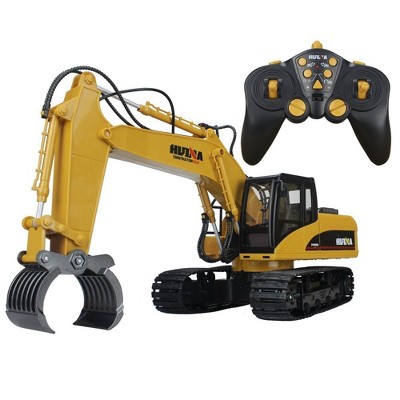Understanding How Excavator Functions and Its Influence On Effectiveness
Excavators play a necessary role in construction and mining operations, relying upon a complex interplay of mechanical and hydraulic systems. Their ability to carry out a variety of tasks hinges on both their design and the technology incorporated within. Comprehending these components can greatly influence operational performance and productivity. As advancements remain to improve the sector, one should take into consideration exactly how these modifications will certainly affect future practices and performance.
The Essentials of Excavator Mechanics

The Function of Hydraulic Solutions in Excavators
At the heart of excavator procedure lies the hydraulic system, which plays an essential duty in powering the equipment's activities and functions. This system makes use of pressurized hydraulic liquid to move energy, enabling different activities such as swinging, digging, and lifting. By taking advantage of the concepts of hydraulics, excavators can do jobs with remarkable accuracy and pressure, improving overall functional efficiency.The hydraulic system contains crucial components, consisting of cylinders, pumps, and valves, which work together to regulate the flow and instructions of the liquid. When the driver engages the controls, the hydraulic liquid is routed to specific cyndrical tubes, translating the operator's commands right into physical motion. This mechanism permits receptive and smooth actions, which are necessary in construction and excavation settings. double e volvo rc excavator. The effectiveness of the hydraulic system directly affects the productivity and convenience of the excavator, making it an important component in modern excavation procedures
Trick Components of an Excavator
Comprehending the crucial elements of an excavator is essential for grasping how this effective equipment runs. An excavator is composed of several substantial aspects, consisting of the undercarriage, house, arm, bucket, and boom. The undercarriage supplies stability and mobility, typically including wheels or tracks to browse numerous surfaces. The residence consists of the engine and hydraulic systems, permitting the driver to regulate motion and power the maker. The boom extends from your home, allowing vertical reach, while the arm connects to the bucket, assisting in excavating and lifting operations.Additionally, the cab houses the driver, outfitted with controls for exact maneuvering. Each of these elements plays an essential function in the excavator's general performance, adding to its effectiveness and performance on construction websites. Comprehending these parts assists in preserving and enhancing excavator performance, making certain tasks are finished securely and effectively.
Accessory Convenience and Its Benefits
Accessory versatility is a vital aspect of excavators, making it possible for drivers to switch between various devices tailored for specific tasks. This adaptability not only enhances task performance but likewise adds to cost-effectiveness by decreasing the requirement for multiple equipments. Comprehending the different sorts of accessories offered can considerably impact the total efficiency and functionality of an excavator on task websites.
Kinds of Accessories
While excavators are mostly identified for their digging abilities, their true convenience hinges on the large array of attachments available. These add-ons improve the excavator's performance, allowing it to perform different tasks beyond excavation. Common add-ons consist of containers (for excavating and scooping), hydraulic thumbs (for grasping materials), and augers (for drilling openings) Grapples are used for handling and moving debris, while rippers can separate hard surface areas. Various other specialized add-ons, such as plates and rakes, enable excavators to adjust to certain work needs. This diversity not just increases the equipment's utility throughout different fields, consisting of demolition, building and construction, and landscaping, but additionally allows drivers to customize their equipment to meet details project needs effectively.
Increased Task Effectiveness
Optimizing task effectiveness is a main advantage of making use of numerous excavator add-ons. Various accessories enable an excavator to perform several tasks without needing to switch devices, saving important time and labor. Making use of a hydraulic hammer can break concrete while a bucket accessory can excavate dirt, making it possible for a seamless operations. This flexibility decreases downtime linked with tools modifications and enhances performance on-site. Additionally, specialized add-ons improve precision in tasks such as grading or landscaping, resulting in better results. The capability to adapt to various work requirements not only simplifies operations but additionally lessens the requirement for extra equipment, making sure that jobs are finished promptly and efficiently. In general, accessory flexibility substantially adds to enhanced work performance in excavation work.
Cost-Effectiveness and Versatility
Cost-effectiveness is a significant benefit of using functional excavator accessories. These attachments allow a solitary excavator to do several tasks, reducing the demand for added equipment and labor - double e volvo rc excavator. By changing between containers, hammers, and grapples, drivers can take on different jobs, from digging to demolition, consequently making best use of tools application. This flexibility not only decreases operational expenses but likewise minimizes downtime associated with changing tools. Additionally, the capability to customize excavators with specialized accessories improves productivity, as they can effectively manage varied tasks according to task needs. In conclusion, the mix of cost-effectiveness and adaptability in excavator add-ons adds to enhanced functional efficiency and resource appropriation in building and excavation jobs

Advanced Modern Technology in Modern Excavators
Modern excavators are progressively equipped with innovative innovation that changes excavation processes. Automation improves procedures, while enhanced gas performance minimizes functional costs. Furthermore, smart control systems boost precision and security, marking a considerable advancement in excavation tools.
Automation in Excavation Processes
As excavation modern technology develops, automation has actually become a critical component in enhancing effectiveness and accuracy on task sites. Modern excavators are geared up with advanced automated systems that help with jobs such as grading, digging, and trenching with marginal driver treatment. These systems utilize sensing units, GPS, and device learning formulas to guarantee precise placing and deepness control, considerably decreasing the margin for error. Additionally, automation enables operators to concentrate on strategic decision-making instead of manual controls, bring about improved performance in general. Such innovations not just improve process yet additionally enhance security by decreasing human mistake in complicated procedures. Consequently, the assimilation of automation in excavation processes stands for a significant advancement in construction modern technology, driving the market towards better efficiency and performance.
Enhanced Gas Performance
Improvements in technology have actually likewise brought about considerable improvements in fuel effectiveness for contemporary excavators. Modern machines are geared up with innovative engines that optimize power outcome while lowering fuel intake. These engines make use of ingenious combustion technologies, such as turbocharging and straight fuel shot, to enhance efficiency and performance. Additionally, lightweight materials in building minimize total weight, allowing for much less energy expenditure throughout procedure. The introduction of variable speed controls enables drivers to readjust engine performance according to particular tasks, even more decreasing fuel usage. Therefore, these enhancements not only reduced functional prices but likewise contribute to ecological sustainability by minimizing exhausts. Overall, enhanced gas efficiency in excavators is an essential development that boosts performance and financial viability in the building sector.
Smart Control Solution
While operators browse significantly complex task websites, wise control systems in excavators have become important tools for enhancing effectiveness and accuracy. These sophisticated modern technologies use sensors and formulas to keep track of various specifications such as load weight, terrain problems, and operational efficiency. By automatically changing hydraulic features, clever systems optimize equipment efficiency, resulting in boosted performance and minimized endure elements. Additionally, drivers take advantage of user-friendly user interfaces that give real-time feedback and diagnostics, enabling informed decision-making. This combination of modern technology not only improves procedures yet additionally reduces human error, adding to safer workplace. As the building sector remains to evolve, smart control systems will play an important function fit the future of excavator efficiency and effectiveness.
Enhancing Operational Performance With Excavators
Excavators play a vital duty in boosting operational performance throughout numerous building and construction and excavation jobs. Their adaptability enables numerous jobs, including excavating, material, and training handling, which simplifies workflows and lowers the need for added tools. With powerful hydraulic systems, excavators can carry out durable tasks with precision, significantly reducing the time needed to total jobs. The integration of innovative modern technology, such as general practitioner and automated controls, even more optimizes their operation, making it possible for drivers to achieve better accuracy and decrease product waste. In addition, modern-day excavators are made to eat less fuel and lessen emissions, adding to both cost savings and ecological sustainability. By making use of excavators successfully, building groups can improve performance, satisfy task due dates, and boost overall website management. This multifunctionality and effectiveness make excavators crucial tools in the contemporary building landscape.
The Future of Excavators in Construction and Mining Industries
As the building and mining markets advance, the future of excavators is poised for considerable improvement driven by technical innovation and altering functional needs. Advancements in automation and synthetic knowledge are reshaping excavator capabilities, permitting for boosted precision and effectiveness in operations. Autonomous excavators are arising, lowering the demand for human intervention and reducing the risk of accidents.Moreover, the assimilation of telematics and IoT modern technology allows real-time tracking of device efficiency and predictive upkeep, maximizing uptime. Environment-friendly styles, consisting of electric and hybrid models, are getting traction, lining up with sustainability goals within the industry.Additionally, using innovative materials and lighter layouts enhances gas efficiency while preserving efficiency criteria. As these fads progression, excavators will play a crucial duty in fulfilling the raising demands for productivity and safety and security in building and construction and mining, inevitably transforming operational landscapes.
Regularly Asked Inquiries
Exactly How Do Weather Condition Problems Influence Excavator Efficiency?

Climate condition substantially affect excavator efficiency, as rain and mud can prevent grip and stability, while severe temperature levels click reference might impact hydraulic systems. Operators must adapt to these variables to ensure optimal capability and security during procedures.
What Precaution Should Operators Adhere To While Making Use Of Excavators?
Security actions for excavator drivers consist of using suitable Source individual safety equipment, performing pre-operation evaluations, making sure correct interaction with ground workers, preserving a risk-free distance from above threats, and adhering to well established operational procedures to avoid mishaps.
How Commonly Should Excavators Be Preserved for Optimal Efficiency?
Excavators need to be kept consistently to assure peak performance, generally every 250 operating hours or as defined by the supplier. Regular checks enhance integrity, avoid unexpected malfunctions, and prolong the life expectancy of the devices.
What Is the Average Lifespan of an Excavator?
The average lifespan of an excavator typically varies from 10,000 to 15,000 hours of operation. Elements influencing long life include upkeep practices, running conditions, and the top quality of the maker itself, influencing overall performance and performance.

Can Excavators Operate Uneven Surface Successfully?
Excavators can operate successfully on unequal surface due to their verbalized designs and flexible tracks. These attributes allow them to maintain security and grip, enabling reliable procedure in challenging atmospheres generally encountered in building and landscape design tasks. Each of these elements plays a vital role in the excavator's total capability, contributing to its efficiency and effectiveness on building and construction sites. Optimizing work effectiveness is a primary benefit of making use of various excavator attachments. While drivers browse progressively intricate job websites, wise control systems in excavators have actually emerged as important devices for improving efficiency and precision. Excavators play an essential role in improving operational effectiveness across various building and construction and excavation tasks. Breakthroughs in automation have a peek at this site and artificial knowledge are improving excavator capacities, enabling for improved precision and performance in operations.
Comments on “How the remote control excavator Streamlines Complex Site Preparation Tasks”